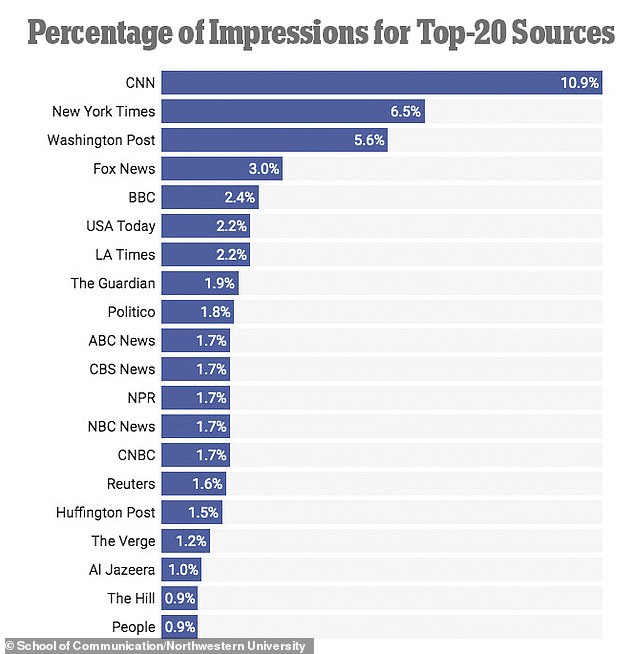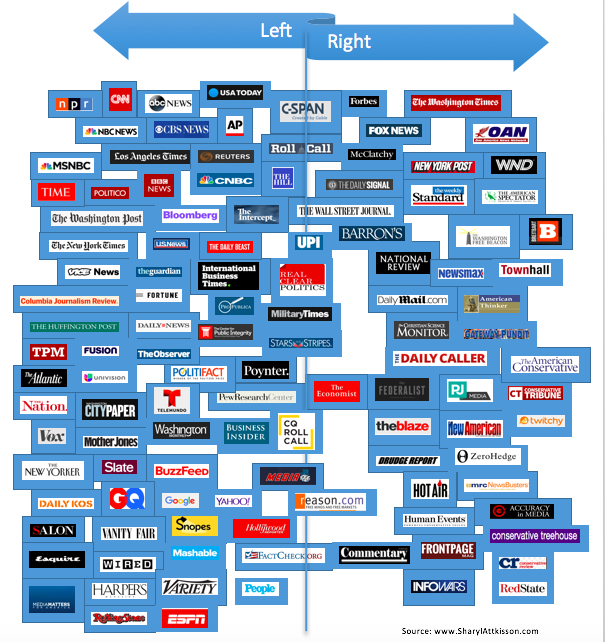by Lil Tuttle
It may be a world-wide web, but Google only selects a small slice of it for us to see. An academic study, or algorithm audit, of the Google Top Stories box released this month by two Northwestern University researchers, Search as News Curator: The Role of Google in Shaping Attention to News Information, found that there is “a considerable degree of source concentration.”
Results indicate that a majority of impressions went to only 20 news sources, all of which can be considered mainstream, national news outlets. Two sources, CNN and NYT, accounted for 17.4% of the impressions observed. These results are both consistent with and more extreme than previous audits [12] indicating the dominance of CNN and NYT. These two sources dominate when considering the breadth of their coverage as well as within individual query terms.
The graphic below shows the top 20 news sources used by Google to select its Top Stories:

Using investigative journalist Sharyl Atkisson’s media analysis chart (below), we found that 17 of the 20 selected Google sources – or 85 percent – are left-leaning.

Why it Matters?
The Google Top Stories box is both “a prominent component of search engine results” and “a powerful driver of traffic to news publishers,” according to authors Daniel Trielli and Nicholas Diakopoulos at Northwestern University’s School of Communication.
This box is a component of search engine results pages (SERPs) that highlights news articles with headlines, images, and links. In previous audit work, this component was found in the first position in about 30% of search queries [17], underscoring its attention-attracting prominence for many queries.
A large percentage of Americans – 43 percent according to a 2017 Pew survey – get their news online, and Google handles an estimated 63% of all search queries in the U.S. Moreover, 50 percent of all external traffic to online publishers is referred by Google.
As a consequence, Google exerts substantial influence over what news many people see and how it is interpreted.
News curation algorithms can have important implications because of how ranking impacts attention. Users both click more often and believe a result is more relevant if it is in a higher position [7]. As a result, search engines can affect users’ attitudes, shape opinions, alter perceptions or reinforce stereotypes, and impact how voters come to be informed during elections [8, 9, 10, 11].
An experiment of 2,150 people using mock search results during the 2014 Indian elections indicated that 24.5% of undecided voters could be swayed by biased rankings in search results [12]. Search algorithms thus play a key role in how people are exposed to information and may develop robust and diverse viewpoints on societally relevant issues, having deep political ramifications [13].
Ultimately, the sources we choose and what we read are really up to us. I personally prefer Instapundit, a news aggregator run by law professor Glenn Reynolds. I also enjoy daily reads at American Thinker, American Greatness, the Federalist, American Spectator, and Real Clear Politics. All of these present a nice counterpoint to the echo chamber we get from modern media.
Find your own reliable sources, and check them regularly. It’s better than relying on Google’s limited selections.
